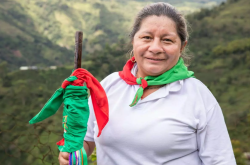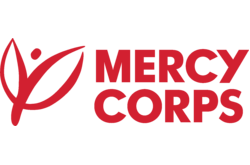In the luscious and fertile green hills of Cauca in southwestern Colombia a coffee farmer and indigenous women’s rights activist works tirelessly to improve the lives of her community and tend to the land where her family is from. Libia Armida Paz lives in La Sierra on the El Oso reserve, a village home to the indigenous Yanakona people.
Libia began farming coffee at seventeen years old, against her father’s gendered expectations. She took on a job on her neighbor’s farm in secret, sneaking out every morning before her father woke. She was paid 300 pesos less than the adult workers to pick coffee, but she didn’t mind because the experience was worth it.
She studied tirelessly, saving money she earned from working on farms to attend college and earn a nursing degree. She saved enough money over a 15-year nursing career to buy her own land—something most women are not able to do in Cauca. Libia understands the importance of ensuring that other women have access to the same opportunities.
Libia ran for local government because she wanted to help with housing needs in her community. She began as a secretary and became the village governor in 2003—serving three terms in the following years. Libia’s first project as governor was improving and refurbishing 60 houses, while still practicing as a nurse and coffee farmer.
Quickly, she rose to the title of “Crin minister,” a highly respected position that represents indigenous people both in Cauca, and nationally across Colombia. “I was the first woman from my people to reach that position and no one else has been able to do so,” she says proudly. In October 2022, Libia was officially sworn before the governor of Cauca to be a member of the departmental women's advisory council.
Through Mercy Corps’ Rural Women of Cauca Program, Libia and 1,800 women have received agricultural and small business training in order to boost their incomes. The program also provides financial management to ensure that women have economic security. Land titling is also a crucial component, because as families acquire formal land rights, they are able to increase their agricultural productivity and build healthier communities.
In addition to economic support, the program has influenced public policy on preventing gender-based violence. Psychosocial care is a cornerstone of this program to help young people close the cycle of violence by building networks among teachers, parents, and government institutions at the local and national levels—an initiative that Libia was informally leading before the program.
About the impact of the program, Libia says, “It’s one thing to be a woman and it’s another thing to empower oneself as a woman. To make your rights respected as a woman. That was important.” Last year, Libia turned 57 years old and retired from nursing. But she feels there’s still more work to be done and hopes to study law next. “I want to study to be a lawyer and help a lot of people,” says Libia.





